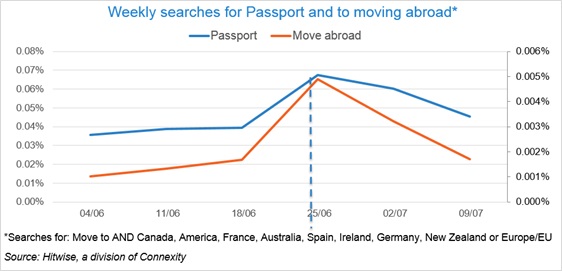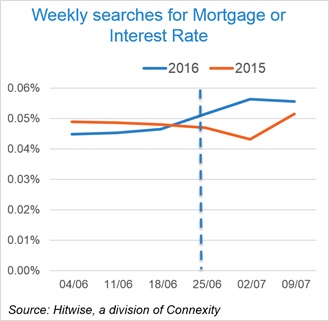The UK’s interest in joining a political party has increased by 7,000% post-Brexit, according to new research looking into search trends after the shock result of the EU referendum.
The data, from Hitwise, shows concerns people have about how the latest political developments will affect their everyday lives, but also how Brits are taking matters in their own hands.
Key findings include:
– 7,000% increase in people searching to join a political party
– 300% increase in searches for moving abroad
– Increased searches for ‘mortgage’, ‘interest rate’ and ‘gold’
– Interestingly, there was in fact no change to searches for holidays or flight searches
Key trends are particularly evident across financial and travel related searches, demonstrating that Brits are taking matters into their own hands to find answers. This goes one step further with searches to join one of the parties represented in the House of Commons increasing by 7,000 per cent[i].
A high volume of Brits were considering a move overseas, with Hitwise witnessing a 300 per cent increase in searches for ‘move to [one of the eight leading countries OR European Union*]’ immediately after the Referendum, though those searches have since declined to nearly pre-Brexit levels.

‘Passport’ searches, however, peaked after the result and remain high suggesting Brits are keeping their options open. Searches for Irish, German, Italian and Polish passports were most common, demonstrating a sudden urge for those living in the UK to secure a dual citizen passport where they can.
Interestingly, and despite the weaker pound post-Brexit, searches for ‘holidays’ or ‘flights’ have not been impacted and followed a similar pattern to what was observed at this time in 2015 – in fact, international destinations account for a greater share of holiday and flight searches this year compared to last.

With consideration for family security and wellbeing front of mind, Hitwise found the financial implications of Brexit to be one of the nation’s greatest concerns. Brits’ desire for a stable future – and uncertainty about the state of the UK economy – was reflected in a search increase for ‘mortgage’ and ‘interest rate’ queries, compared to the year before.
In the hours and days immediately after the Referendum result, Brits’ concern with the value of the pound skyrocketed. And whilst the initial rush to check the rate against other leading global currencies has ebbed, related searches two weeks after the Referendum were still more than three times higher than they were before the vote.

This financial nervousness is evident in the corporate investor space too. The first full week after the vote, searches for ‘gold’ were at least 1.5 times higher than Hitwise observed at any point during the last three years. Similarly, ‘Share price’ searches increased almost 300 fold the week after the referendum results were announced.
Exploring how Brexit will impact day-to-day Britain, the result of the EU Referendum hit the world of automotive, seeing searches around the impact to vehicle prices spike nearly 1,000%.
Nigel Wilson, managing director at Hitwise, says “These results show us that Brexit is driving concern across the entire country in terms of how it will impact peoples’ lives and future ambitions. While significant numbers of Brits are unlikely to actually uproot and move abroad, the findings from our data provide insight into the nation’s response.
During this sensitive time, it’s important for marketers to understand the rapidly changing feels Brits have towards their lifestyle and life plans and it is important for brands to acknowledge the effect this is having on Britain’s online behaviour.”
